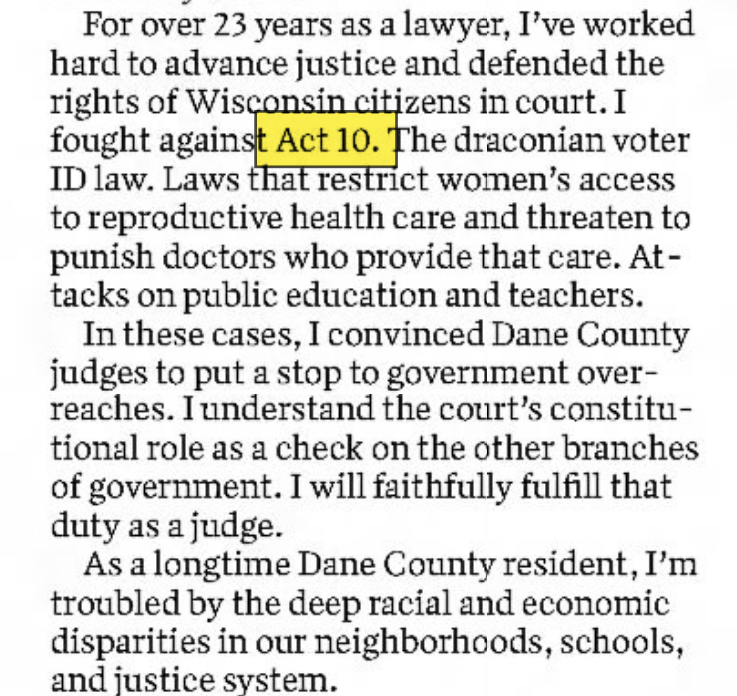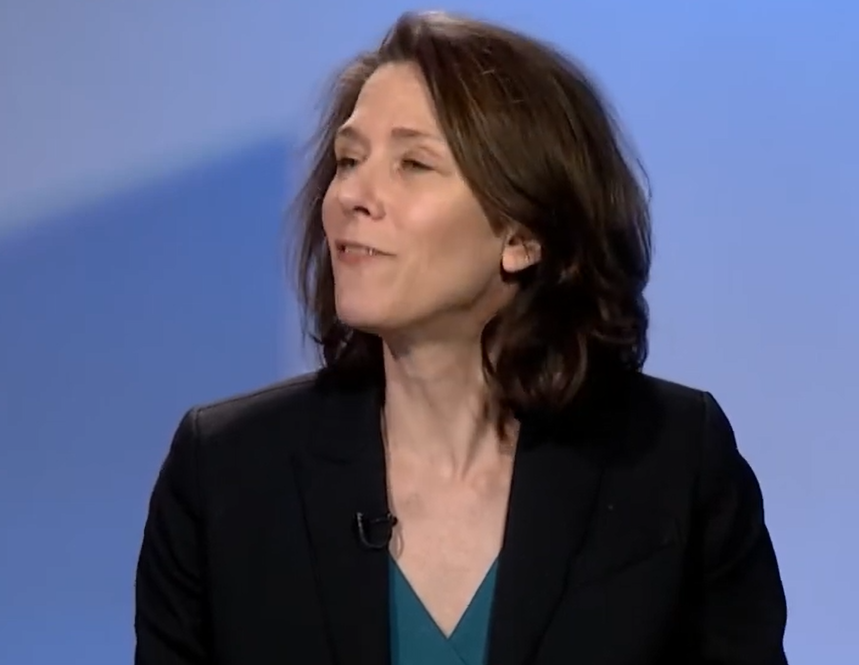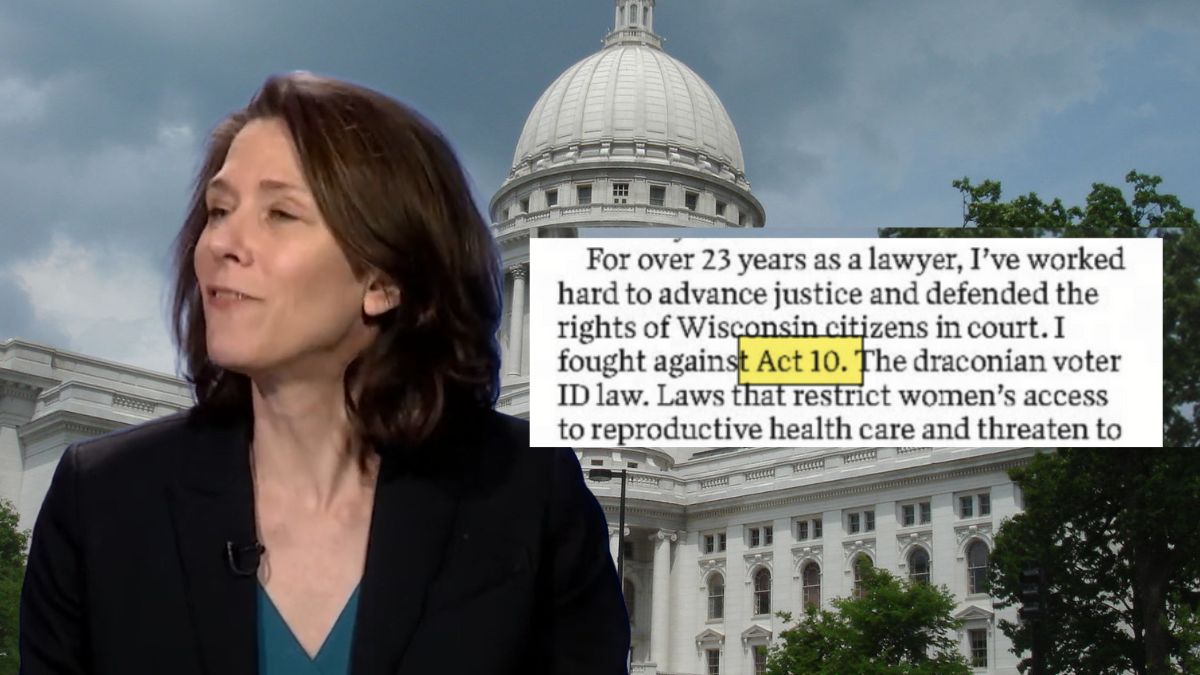Susan Crawford played a “huge role” in trying to invalidate Act 10 – attorney Lester Pines
Wisconsin Supreme Court candidate Susan Crawford bragged, “I fought against Act 10.”
The Democratic Party-endorsed Crawford made the comment in a column in the March 28, 2018, Capital Times. As a private lawyer for the firm Pines Bach in 2012, Crawford helped convince a Dane County judge to strike down “significant portions” of Act 10, according to the firm’s website.
“By the best estimate, the Act 10 reforms saved Wisconsin taxpayers between $18 billion and $31 billion since 2012,” per the Badger and MacIver Institutes.
The then conservative majority on the Wisconsin Supreme Court upheld Act 10 in 2014, and a federal appellate court did so as well that same year.
Fast forward to 2025. Crawford, a leftist Dane County judge and attorney, is battling former Republican Attorney General Brad Schimel for a seat on the court.
The court will almost certainly hear yet another constitutional challenge to the long-settled Act 10, which was just invalidated by another liberal Dane County Judge.
Crawford’s first case at the Madison law firm “involved challenging Act 10 — that required her to be sneaked into the state Capitol so state Rep. Peter Barca could sign an affidavit,” the Wisconsin Law Journal reported in 2018.

When Democratic senators tried to thwart the governing process by fleeing the state, Crawford tried to give them public legal cover.
“Hoping to stall a vote on Act 10, 14 Democratic state senators left Wisconsin for three weeks. This infuriated Senate Majority Leader Scott Fitzgerald, who issued a memo announcing that arrest warrants would be issued for the missing senators,” according to Super Lawyers.
“Pines and colleague Susan Crawford immediately sent a press release to every media outlet in the state saying the Senate had no authority to have the Democrats arrested.”
The Wisconsin State Journal wrote in 2018 that Crawford “pledges to avoid conflicts of interest.”
But would she? They’ve switched the parties in the new lawsuit, which she may seize on to avoid recusal.

It’s explicitly clear that Crawford opposes Act 10 because she literally tried to get it overturned in court – and almost succeeded.
Even the liberal Wisconsin Watch concluded that “yes,” Crawford tried to overturn Act 10.
According to WUWM, Schimel, when he was attorney general, “said that he would defend Act 10 and took a stance that its restrictions shouldn’t apply to police and firefighter unions.”
Schimel’s campaign put out a statement when the Dane County judge recently overturned parts of Act 10. “Today’s decision by a Dane County judge is just the latest instance of the Left using the justice system to satisfy their donors and dismantle laws they don’t like. It’s why Democrats have anointed a radical Dane County judge (who helped lead the fight to overturn Act 10) to be their pawn on the Wisconsin Supreme Court,” it says.
Today's decision by a Dane County judge is just the latest instance of the Left using the justice system to satisfy their donors and dismantle laws they don't like. It's why Democrats have anointed a radical Dane County judge (who helped lead the fight to overturn Act 10) to be… https://t.co/Ipw0m8bmOV
— Team Schimel (@TeamSchimel) December 2, 2024
In a 2011 segment on the constitutionality of Act 10, PBS Wisconsin described Crawford as “an attorney working on behalf of state public worker unions.”
She squared off against conservative lawyer Rick Esenberg in that interview.
“Yes, we do,” she said when asked if she and the other lawyers on her team believed Act 10 violated the state Constitution. Esenberg disagreed.

Crawford argued that Act 10 has provisions “crippling public employee unions.”
Esenberg said that collective bargaining was a creation of the Legislature. “What the Legislature has given – and it gave public employees broad collective bargaining rights in the late 1950s – it can take away or limit. And that’s all that Act 10 does. It’s something that is the case in a number of states in this country.”
He said that Act 10 “gives municipalities and school districts greater flexibility to deal with the absence of state funding.” School districts have been able to avoid layoffs and be more efficient because of Act 10, Esenberg said.
In 2012, Pines Bach wrote, “On September 14, 2012, Dane County Circuit Judge Juan Colas ruled that significant portions of Act 10, the drastic revisions made in 2011 to the law that governed Wisconsin’s public employee unions and the scope of collective bargaining, were unconstitutional.”
The law firm’s statement crowed: “Among other things, the judge struck down Act 10’s severe limitation on the unions’ and municipal employers’ ability to bargain wages and prohibition against bargaining other employment terms, the prohibition on dues deductions from union members’ salaries, and the requirement of annual recertification elections by supermajorities. Plaintiff Madison Teachers, Inc. is represented in the case by CWPB attorneys Lester Pines, Susan Crawford and Tamara Packard.”
“Susan Crawford and Tamara Packard played a huge role in these cases,” Pines told the Capital Times in 2012, referring to Act 10 and a challenge against the state’s Voter ID law.







![Governor Caught Playing Politics with Brillion Residents’ Lives & Livelihood [COLUMN] ron tusler](https://www.wisconsinrightnow.com/wp-content/uploads/2025/07/MixCollage-15-Jul-2025-03-35-PM-9568-265x198.jpg)


![Protecting Portland: No Good Deed Goes Unpunished [REVIEW]](https://www.wisconsinrightnow.com/wp-content/uploads/2025/07/portland-265x198.jpg)
